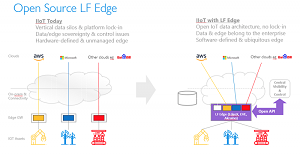News
Linux Foundation Offers Open Source Framework for Edge, IoT
The Linux Foundation believes the edge computing space -- where IoT and other devices do their own processing -- is so proprietary and fragmented that it created an umbrella organization to bring things to common order, at least in the open source world.
The foundation recently launched LF Edge, described as an open and interoperable edge computing framework that is independent of hardware, silicon, cloud or operating system.
"By adopting the umbrella formula utilized by other existing LF projects such as CNCF and LF Networking, LF Edge will provide an open framework to address market needs for edge and IoT by combining new and existing stacks and consolidating them into one singular, customizable framework," said the foundation's Arpit Joshipura in a blog post last week (Jan. 24).
For those still confused about exactly what "edge" computing means, Joshipura also provided a handy definition:
It's a distributed computing paradigm in which computation is largely or completely performed on distributed device nodes known as "smart devices" or "edge devices," with between five and 20 milliseconds of latency (as opposed to primarily taking place in a centralized cloud environment).
He provided non-traditional video or non-connected, moving devices like drones and cars as examples of edge examples.
 [Click on image for larger view.] LF Edge (source: Linux Foundation).
[Click on image for larger view.] LF Edge (source: Linux Foundation).
LF Edge will serve as a counterpart to the "heavily fragmented" edge market that features "multiple proprietary stacks for each public cloud," whether it be AWS, Microsoft Azure or another. Even the open source market is fragmented, with different groups working independently to achieve similar goals, and that's the problem LF Edge was created to address.
The initial initiative starts with five foundational projects that previously operated independently, described by the foundation thusly:
- Akraino Edge Stack is creating an open source software stack that supports high-availability cloud services optimized for edge computing systems and applications;
- EdgeX Foundry is focused on building a common open framework for IoT edge computing.
- Home Edge Project, seed code contributed by Samsung Electronics, is a new project that concentrates on driving and enabling a robust, reliable, and intelligent home edge computing framework, platform and ecosystem running on a variety of devices in our daily lives.
- Open Glossary of Edge Computing provides a concise collection of terms related to the field of edge computing.
- Project EVE (Edge Virtualization Engine), contributed by ZEDEDA, will create an open and agnostic standard edge architecture that accommodates complex and diverse on- and off-prem hardware, network and application selections.
LF Edge is reportedly backed by dozens of major industry players, including: AT&T, Dell EMC, Ericsson, HP Inc., HPE, IBM, Intel, Juniper Networks, Red Hat and many more.
The foundation said the number of edge devices is expected to number more than 20 billion by 2020, with new video applications a driving factor.
About the Author
David Ramel is an editor and writer at Converge 360.